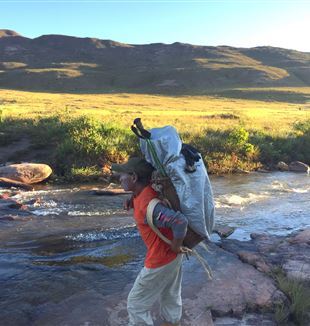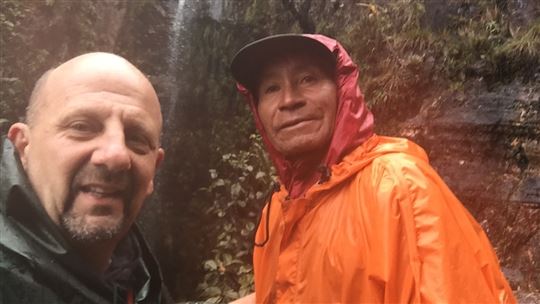
Amazonia/4: The treasure of a wise man
Venezuela, on the slopes of Mount Roraima, Theodore and his Catholic people hadn’t seen a priest for a long time. The story of a casual encounter and the beginning of a friendship.Parai-Tepui is a village located in south-western Venezuela. Teodoro lives there, where he works as a farmer and guide on Mount Roraima, considered to be the oldest mountain on earth, and protected in the Canaima National Park. This region, also called Gran Sabana, is inhabited by the Pemon indigenous people who speak Castilian, as well as the language of their ancestors, Taurepan.
On a recent trip to Venezuela with a group of friends, we were lucky enough to meet Theodore and his people, whom we knew nothing about, while we crossed their land. We asked them to guide us through this region of Tepuis, where stone towers rise up in the middle of a great plain.
On the afternoon of the first day, when we had arrived at the location where we set up camp and from which we could admire a spectacular sunset, I approached our guide and said that we wanted to celebrate mass. We invited them to attend, even though I presumed that they weren’t Catholic and would have declined the invitation.
When Teodoro heard the word "mass", he was moved, but he didn't say anything. He then addressed the rest of his companions in their mother tongue. We couldn’t understand what they were saying, but, in the end, everyone took part in the liturgy. At the end of mass, they began to sing religious songs in Taurepan and told us that they too were Catholic and that their people had been evangelized by the Benedictines at the beginning of the 20th century. They explained that a priest hasn’t visited them for a long time and they had never met a group of Catholic friends who, like them, were a “tribe”.
Mutual affection was born, which grew as we got to know each other better, and it seemed as though nothing could separate us.
Teodoro began to ask me, day after day, things that I could never have imagined. First, he asked me if I could confess the whole Pemon group that was accompanying us; then, he suggested that I conclude the four-day walk in his village by celebrating mass for all his people, something that hadn't happened for a long time; finally, he asked me to confess all his people, because– I can't imagine how, since there was no phone signal – people, all over the region, had found out that we were there and had expressed this desire.
On the last night, in order to arrive in the village on time and to be able to confess those waiting for me, Teodoro and I went ahead of the group that had accompanied us for five days. We walked in the moonlight for several hours, alone. I took the opportunity to talk to him, a wise man, who told me how Christianity has been a great treasure for his people, which had made them different from other neighbouring communities, who were still tied to a mentality that was subjugated to the forces of nature. It was dawn when we arrived in Parai-Tepui. A large group of people stood around the chapel, waiting in line for confession. My companion was swooning with happiness for his people, his greatest treasure.
#SynodAmazon #LatinAmerica